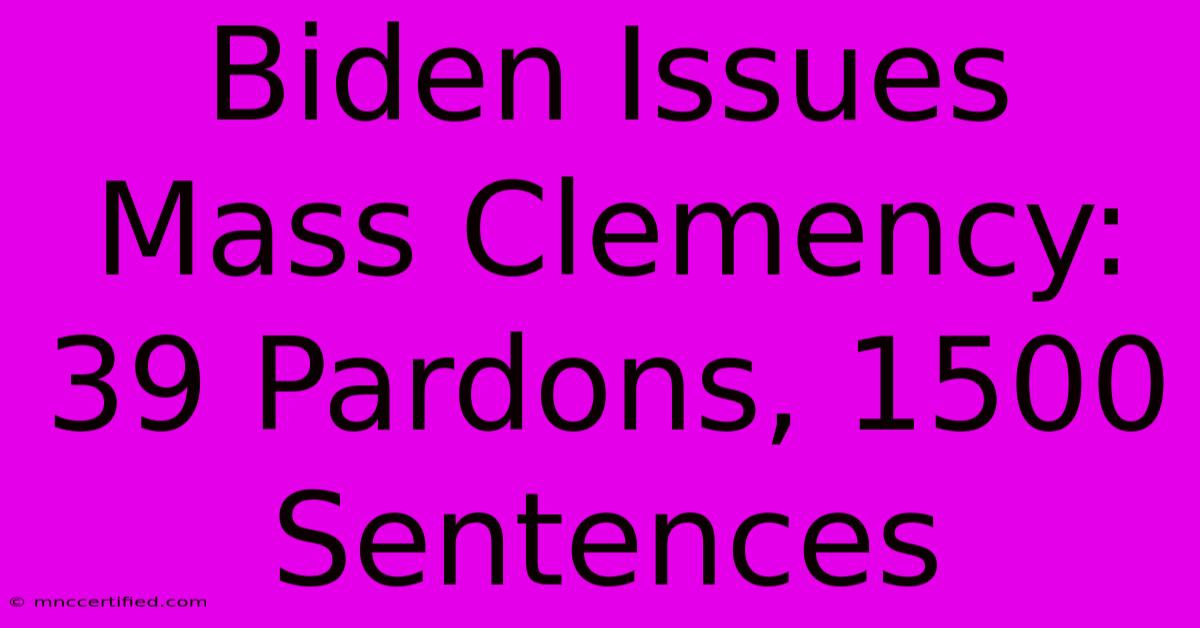Biden Issues Mass Clemency: 39 Pardons, 1500 Sentences

Table of Contents
Biden Issues Mass Clemency: 39 Pardons, 1500 Commuted Sentences – A Deeper Look
President Biden's recent announcement of a mass clemency initiative has sparked significant discussion. This action, involving 39 pardons and the commutation of sentences for over 1500 individuals, represents a substantial step in addressing criminal justice reform. This post will delve into the specifics of the announcement, its implications, and the broader context of presidential clemency.
Understanding Presidential Clemency: Pardons vs. Commutations
Before examining the details of Biden's actions, it's crucial to understand the difference between a pardon and a commutation.
-
Pardon: A pardon completely wipes away a criminal conviction. It's as if the crime never happened, restoring all civil rights lost due to the conviction.
-
Commutation: A commutation reduces a sentence, shortening the time an individual must serve in prison or altering the type of punishment. It doesn't erase the conviction itself.
Biden's announcement encompassed both, demonstrating a multifaceted approach to addressing past sentencing disparities and providing second chances.
The Details of Biden's Clemency Initiative
The 1,750 grants of clemency—a combination of pardons and commutations—were not randomly selected. They targeted individuals serving sentences for non-violent drug offenses, fulfilling a key campaign promise. The administration emphasized that these individuals had demonstrated rehabilitation and posed no ongoing threat to public safety. The selection process likely involved a rigorous review of individual cases, taking into account factors like criminal history, conduct while incarcerated, and the nature of the original offense.
Key Features of the Initiative:
- Focus on Drug Offenses: The majority of clemency grants were for individuals convicted of drug-related crimes, reflecting the ongoing debate surrounding the war on drugs and its disproportionate impact on certain communities. This targeted approach underscores the administration's commitment to addressing systemic injustices within the criminal justice system.
- Emphasis on Rehabilitation: The White House highlighted the recipients' demonstrated commitment to rehabilitation, emphasizing that clemency was not simply a matter of reducing sentences but also an opportunity to support successful reintegration into society.
- Transparency and Equity: While the exact criteria for selection remain somewhat opaque, the administration emphasized a commitment to transparency and ensuring equitable consideration of applications.
The Broader Implications of Biden's Actions
This mass clemency initiative carries significant implications, extending beyond the individual recipients:
- Criminal Justice Reform: It serves as a strong statement on the need for comprehensive criminal justice reform, particularly regarding sentencing disparities for drug offenses.
- Second Chances: The initiative provides a path toward rehabilitation and reintegration for those who have served their time and demonstrated a commitment to positive change.
- Political Significance: The move holds political weight, showcasing the Biden administration's stance on social justice issues and potentially influencing future policy debates.
Comparing Biden's Clemency to Past Administrations
While not unprecedented, the scale of Biden's clemency initiative distinguishes it from previous administrations. Obama's clemency efforts, particularly regarding drug-related offenses, were substantial but perhaps not as broad in scope. The sheer number of grants, coupled with the administration’s focus on rehabilitation, places this initiative within a unique context. This comparison highlights an ongoing evolution in the approach to presidential clemency.
Future Outlook and Potential Criticisms
While widely praised by advocates for criminal justice reform, the initiative will undoubtedly face criticism. Concerns about public safety and the potential for recidivism are likely to be raised. Furthermore, some may argue that the selection process lacks sufficient transparency or that the initiative does not go far enough to address systemic injustices.
Despite these potential criticisms, Biden's mass clemency initiative marks a significant step toward reforming the criminal justice system, emphasizing rehabilitation and providing second chances for thousands of individuals. The long-term impact remains to be seen, but the action itself signifies a powerful shift in the approach to sentencing and justice.
Keywords: Biden clemency, presidential pardon, commutation of sentence, criminal justice reform, drug offenses, non-violent crimes, mass clemency, rehabilitation, second chances, Obama clemency, social justice, sentencing disparities.

Thank you for visiting our website wich cover about Biden Issues Mass Clemency: 39 Pardons, 1500 Sentences. We hope the information provided has been useful to you. Feel free to contact us if you have any questions or need further assistance. See you next time and dont miss to bookmark.
Featured Posts
-
18 Year Old Gukesh Sets Chess Record
Dec 13, 2024
-
Satch Vai Satriani Vai Joint Tour
Dec 13, 2024
-
Morgan Wallens Guilty Plea And Sentence
Dec 13, 2024
-
World Chess Champion Gukesh Dommaraju
Dec 13, 2024
-
Week 15 Player Props Rams 49ers Best Bets
Dec 13, 2024